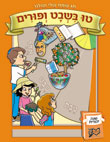The Jewish Year track explores in Hebrew the personal meaning of Jewish life throughout the year, focusing on three themes: Everyday life, Shabbat, and Holidays.
|
|
Tov Bakita Sheli Veshelanu, Vetov Babait |
 Tov Bakita U'vaBayit (Everyday Life)
Tov Bakita U'vaBayit (Everyday Life)
This unit familiarizes the children with their fellow students and with activities performed in class, extending to their home environment. The Tov Bakita (in the classroom)
aspect of the unit introduces the children to the students of the Virtual Classroom, as well as their actual classmates. The content of the unit is based on the subject matter studied in
Grade 1, and encourages independent learning. The Tov Babayit (at home) component deals with the daily routines in the home concerning clothing, cleanliness, and food.
The unit consists of the following learning materials:
1 student workbook; 4 books for guided reading; 1 teacher manual; 1 big book; 18 library books;
2 project library books; 4 CDs containing all library books; 1 set of games; 2 sets of flash cards;
2 CDs containing 22 songs and a sing along play; 10 classroom posters; 7 big pictures.
|
| |
|
Shabbat Sheli Veshelanu |
 Shabbat Sheli Ve'Shelanu Shabbat Sheli Ve'Shelanu
This unit focuses on our preparations for and celebration of Shabbat - from the lighting of the candles to the Havdalah ceremony - through songs, prayers and exercises
concerning the Shabbat rituals. These rituals are introduced through seven symbolic "windows", beginning with an introduction and followed by:
(*) The lighting of the Shabbat candles
(*) Kabbalat Shabbat
(*) Kiddush and Seuda Rishona
(*) Shacharit prayer and the reading of the Torah
(*) Seuda Shniya and Oneg Shabbat
(*) Mincha prayer and Seuda Shlishit
(*) Havdalah
This unit is offered in two versions - Orthodox and Liberal - in order to accommodate specific school ideologies.
The unit consists of the following learning materials:
1 student workbook; 1 teacher manual; 7 library books; 1 CD containing all library books; 1 set of games;
1 set of flash cards; 2 CDs containing 26 songs, prayers, blessings and kiddush; 1 classroom poster.
|
| |
|
The Holidays |
This sub-track consists of 4 units, covering the major Jewish holidays: The High Holidays and Chanukah;
Tu Bishvat and Purim; Pessach and Shavuot; Yom Ha'atzmaut and Yom Yerushalayim. Each unit explores the
Biblical and/or historical background of the holiday, as well as its rituals and customs, through stories,
songs, games and experiences.
The unit consists of the following learning materials:
 The High Holidays and Chanukah:
The High Holidays and Chanukah:
1 student workbook; 3 books for guided reading; 1 teacher manual; 1 big book; 7 library books;
3 project library books; 2 CDs containing all library books; 2 sets of games; 2 sets of flash cards;
2 CDs containing 22 songs and blessings; 4 big pictures. |
 Tu Bishvat and Purim:
Tu Bishvat and Purim:
1 student workbook; 2 books for guided reading; 1 teacher manual; 1 big book; 5 library books;
5 project library books; 2 CDs containing all library books; 2 sets of games; 2 sets of flash cards;
2 CDs containing 15 songs and blessings; 6 big pictures. |
 Pessach and Shavuot:
Pessach and Shavuot:
1 student workbook; 3 books for guided reading; 1 teacher manual; 1 big book; 2 library books; 1 CD containing all
library books; 1 set of games; 1 set of flash cards; 2 CDs containing 35 songs and a sing along play; 7 big pictures. |
 Yom Ha'atzmaut and Yom Yerushalayim:
Yom Ha'atzmaut and Yom Yerushalayim:
1 student workbook; 1 book for guided reading; 1 teacher manual; 1 big book; 2 library books;
1 CD containing all library books; 1 set of games; 1 set of flash cards; 1 CD containing 16 songs
and a musical quiz; 2 classroom posters; 2 big pictures. |
| |
|
Hamachberet Lemazkeret |
 Hamachberet Lemazkeret - The Keepsake Notebook
Hamachberet Lemazkeret - The Keepsake Notebook
The TaL AM curriculum is based
on a constructivist model, continuously adding new information to knowledge previously acquired.
The program repeatedly introduces the motto "It's easy to learn new things when we remember what we've
already learned." TaL AM periodically posts thematic worksheets for the various units and library books,
as well as monthly calendars following the Jewish year, on its website. These pages may be downloaded
and placed in the Keepsake Notebook, or Portfolio, enabling the children to record the information they
learned and would like to remember in each unit, and facilitating the retention of pertinent knowledge
that can be built on in the future.
|
|
|